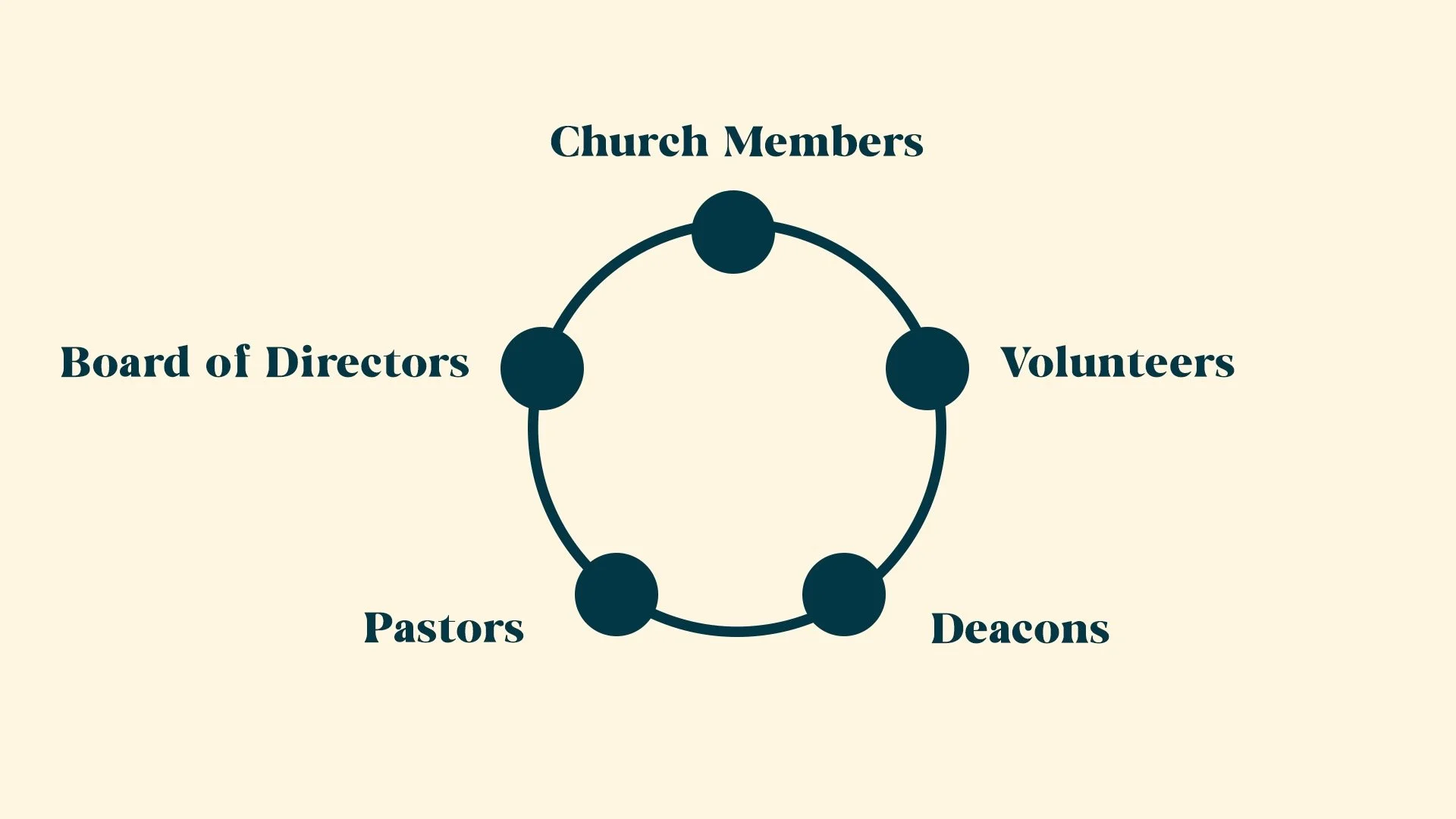Church Leadership Structure at Kindred
Our Leadership Culture
Intro by Liz Mumford, Pastor and Board Member at Kindred
“Culture” is not a static thing. Its ebbing and flowing, pivoting, all while it’s being “created.” It reminds me very much of the genesis story as things catapulted into existence, not only the first living things are depicted as being created, but the first “culture” was formed by the words of God. With all the potential of the raw elements, there he brought order and structure to human existence.
Culture has, and needs, momentum to exist in the present moment - Otherwise wouldn’t it just be a piece of history? Something we look back and say, well in that day, and that culture, they thought “xyz.” But if we are going to talk about our current culture, then we are considering the current place and time that the momentum and movement of human existence has brought us.
Here is how I would love to frame our “leadership culture.” It’s not an org chart with momentum that moves from the top of the triangle down to the foundation. But maybe you could think of it more like a wheel, or maybe like one of those balls on strings things, clickity clacks, where you lift the ball on one side and it sends shockwaves through all the other balls until the one at the end flings out and then back again in response.
Each piece of the leadership structure has its own role in creating momentum and generating actions and reactions. And yet at the same time, they are all attached to the same cog, or the same center point. There is not one role more important than the other, they all create momentum.
And when I say leadership, I think again we often think of a top-down type of authority. But I would invite you to think of leadership more like ripples of influence. And Leadership that creates influential momentum that is beneficial for the parties that are impacted — I will take the definition from Brene Brown -
A leader is anyone who takes responsibility for finding the potential in people and has the courage to develop that potential.
Let’s break that down, and I think you will find that everyone will see they are all leaders in some way in their life -
“Taking responsibility for finding potential in another human” -
Has anyone here ever changed a diaper? In that moment you took the responsibility for the human that didn’t have the power dynamic of being able to remove themselves from their own excrement, and thought to yourself, “this human deserves the dignity of not carrying around a bag of feces on their butt.”
Has anyone here ever taken responsibility for a department’s successes or failures at work? Has anyone ever stepped up at church because they saw a need and felt it was their duty to make sure that it got filled? Any teachers out there? How have you noticed potential in someone else and taken on the role of cultivating it? Did you notice momentum or change in the process? Have you seen other people do this for you and thought, wow that is a good leader?
“Having the courage to develop potential -
Now, what about needing courage- and I will also add the word “capacity,” for seeing that potential through? You saw the diaper needed to be changed but you didn’t have the capacity or courage to change it.
Have you ever noticed a time when you could spot the potential, but you were afraid to step in? Or you knew you didn’t have the capacity at the current moment due to other responsibilities in your life? Have there been times when courage was hard due to trauma or triggers in your life? Did that mean you were a bad person for not charging into that “taking responsibility” phase head-on?
Maybe there are times when our unique perspective gives insight into the first part of that leadership trait - seeing the potential, but we don’t have the capacity to do it, so we need to voice it to the community to enlist help and support. This is why each voice in the room has a place to speak.
What I am trying to establish, is that no one is better than the person next to them. We all have the goodness in us to see potential to want to foster it, and some of us have different varying levels of capacity or courage to step into that. And even those levels change throughout seasons of life.
This is why our thoughts around multi-voiced, flat-level leadership is SO IMPORTANT. Each person has these building blocks of leadership, each one is a leader in their own sphere, and each one has a voice that deserves to be heard AND respected - AND can create momentum for a healthy culture.
Leadership Roles at Kindred
Church Members
An opt-in role that says you would like to be considered as part of the church. You see yourself as someone who wants to attend gatherings, and desires to know and be known by other members of the church. Knowing who wants to be a member helps everyone to make sure you are given opportunities to engage with what the church is doing together.
Volunteers
These folks are task-oriented servant-leaders that recognize the tangible needs of our Faith Community and thrive in participating in such tasks. From setting up the communion table to serving in the kid’s ministry, they find joy in being behind the scenes serving the community. How often they serve can be customized to their capacity and availability. They are given structure and support from the deacons within their area of volunteer work and are invited to give feedback and share wisdom with the deacons to foster the potential and culture of the church.
NOTE: Volunteers don’t need to consider themselves “Christians” to take part in this type of service.
Deacons
Not only do they actively see a physical need and fill that need, but they also take joy in planning and strategizing how to better and more efficiently accomplish needed tasks by leading individual ministries that are formed to serve a specific purpose. The tasks involved in leading can include creating ministry structure, organizing schedules, and recruiting and empowering volunteers to serve alongside them. Types of ministries can be related but not limited to the following: Kids Church, Set-up/tear-down of Sunday gatherings, Hospitality, Musical Worship for corporate gatherings, Community Outreach, AV/Production, and Prayer.
Deacons have a yearly health check-up with one of the Pastors in which they have the opportunity to provide feedback for the leadership, and/or opt-in for another year or shift into a different role. For those who are in partnerships, couples can assume the role of Deacon together, but they can opt in as individuals as well.
Pastors
These leaders take responsibility for the spiritual health and formation of the church. Pastoring (the verb) is something many of us can do, but those with this role are opting-in to be responsible and accountable for that type of community care. They provide additional support to the Deacons’ ministries and assist in caring for the individuals on a spiritual level within those ministries. They are good at slowing down to empower individuals across the church to have a voice. They are humble, willing to admit when they are wrong, and empathetic to the needs of the people they serve. The church’s doctrine and theological foundation is discussed and developed within the pastoral team as they also facilitate the corporate teaching schedule. The pastors work in tandem with the Board of directors to implement the vision of the church.
NOTE: One does not need to be a Pastor to teach at Kindred Church and can either volunteer to teach or be invited by the pastoral team to teach corporately.
Pastors have a yearly health check-up with the Board of Directors in which they have the opportunity to opt-in for another year or shift in to a different role. For those who are in partnerships, couples can assume the role of Pastor together, but they can opt-in as individuals as well.
Pastoral Chair Role
Responsible for coordinating the Pastoral Team meetings, obtaining feedback from all pastors, and implementing and delegating the action items of the team. The chair ensures that task forces within the pastor team are moving forward with their goals and fostering forward progress among the ministries of Kindred Church.
Board of Directors
Ideally, the BoD is a diverse group (between 8-10 individuals) - diverse in race, ethnicity, age, gender, and sexual orientation in order to represent a wide range of perspectives. In this role, the members of the board focus on the high-level strategy, oversight, and accountability of the church.
The Board of Directors may also be Pastors or Deacons, but ideally, there is a mix of pastors, deacons, and non-pastors/deacons on the board. Board Members serve in terms of up to 3 years and are encouraged to take at least a 6-month break before re-upping in order to allow for new voices to enter the team. They are tasked with bringing feedback from all areas and roles of the church and advocate for a vision that meets the needs of the people in the church.
Board of Director Chair Role
Responsible for coordinating the board of director meetings, obtaining feedback from all board members, and implementing and delegating the action items of the board. The chair is also responsible for coordinating the Agenda of quarterly Core leadership Team meetings.
Church Staff -
Any of the role-holders above may be eligible for hire at Kindred Church depending on the needs of the ministry as a whole. Church Staff as a leadership role is not specifically defined as its own role.
If you would like to show interest in filling a leaership role at Kindred, please fill out the form below:


